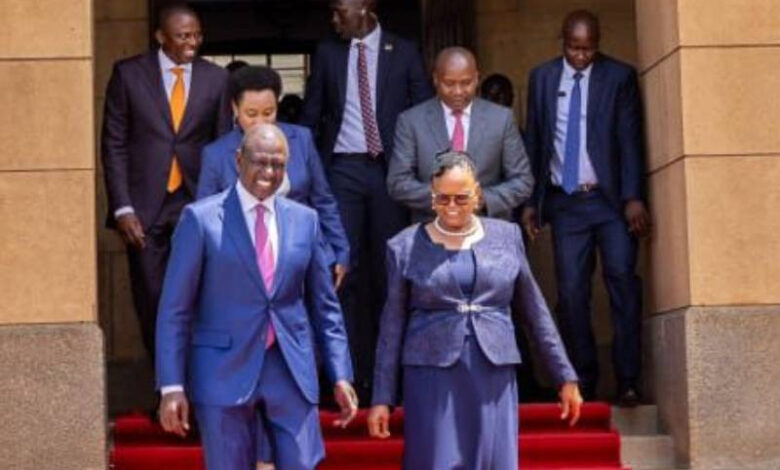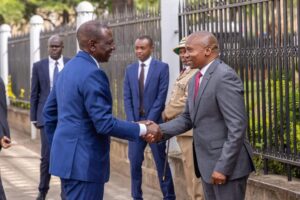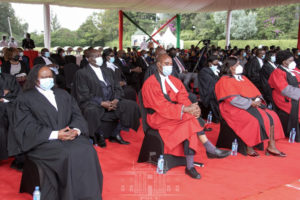Ruto’s National Interest Call Sparks Social Media Debate on Judicial Independence
National Interest or Public Interest? Kenya's Judiciary Faces Tough Questions on Independence

Nairobi, Nov 4 – President William Ruto’s address at the Supreme Court’s 12th-anniversary conference has sparked a fierce public debate on the judiciary’s reach and its balance with executive power. The conference, designed to celebrate the Supreme Court’s achievements since its establishment, provided a platform for critical dialogue about the performance and direction of the judiciary. Ruto seized the opportunity to question what he described as “overreach and interference” in court rulings on national policies, urging the judiciary to recognize his administration’s political mandate as a reflection of national interest.
In a thinly veiled reference to recent rulings against his policies, Ruto argued that judicial decisions should align more closely with the government’s vision, sparking widespread debate on social media about the judiciary’s independence and its role within Kenya’s democratic structure.
Ruto’s criticisms centered around two interconnected issues: the balance between public interest and national interest and the judiciary’s role in overseeing executive decisions. In his view, the national interest — represented, he argued, by his administration’s political manifesto — should sometimes supersede the courts’ interpretations of public interest, especially on matters that fall under his government’s constitutional purview. The President’s stance is that his electoral mandate is a direct reflection of the will of the people, and therefore effectively grants his administration legitimacy that should, in his opinion, be weighed heavily by the judiciary.

“What’s the place of a manifesto, a program that has been voted for by millions of Kenyans alongside a candidate and a party? What weight does the court put whenever there’s a challenge on a manifesto?” remarked Ruto.
He views a government’s manifesto as a binding contract with the electorate, lending legitimacy to decisions aimed at fulfilling these promises. By emphasizing the national interest embedded in his policy agenda, Ruto seemingly suggested that the judiciary should recognize the executive’s primacy in shaping policy, suggesting that court rulings should align with, rather than obstruct, the government’s electoral mandate.
His administration has faced court decisions against several initiatives, including the new University Funding Formula, the Affordable Housing Program, and the Social Health Insurance Fund, which were deemed unconstitutional. He pointedly questioned who checks the judiciary itself, particularly the Supreme Court, stating that it has sometimes strayed beyond its mandate and veered into “populist” territory. The President implied that certain rulings appear influenced by social media and public sentiment rather than strict legal reasoning, challenging whether courts might sometimes play to the gallery rather than adhere to an impartial, objective interpretation of the law.
The tension between public interest and national interest presents a complex challenge for Kenya’s judiciary. Public interest often entails protecting individual rights, promoting transparency, and holding the government accountable — a function the judiciary is explicitly empowered to fulfill. National interest, however, is a more ambiguous concept, one that can be invoked by the executive to justify a range of policies, sometimes at odds with individual freedoms or minority rights.
Busia Senator Okiya Omtatah weighed in decisively, emphasizing the supremacy of public interest as foundational to Kenya’s constitutional framework. “All sovereign power belongs to the people of Kenya. The supremacy of the public is unequivocally established. There can never be true national interest without public interest; fundamentally, for whom does the nation exist? The state is created to serve and protect the public interest, reflecting a core tenet of our constitutional framework,” said Senator Omtatah, emphasizing that as stewards of the law, it’s essential to uphold the constitution and ensure that national policies reflect the public’s interests. Only by prioritizing public interest, he argued, can society achieve true balance and fairness, allowing both individuals and the nation to prosper.
Ruto’s emphasis on national interest reflects a broader trend seen in many democracies where executives seek deference from the judiciary on issues they consider central to governance. In this view, the executive branch, by virtue of being elected, should be allowed significant latitude in implementing its policies. Online critics weighed in warning that the term “national interest” can easily become a catch-all justification for executive actions that, while potentially popular or politically expedient, may infringe on the rights of individuals or minority groups. “The state is a creation of the people. National interest must therefore and at all times serve the public interest and not the other way round,” said Simon Njoroge on his X account

Kenyans on X said Ruto’s concerns about the courts’ potential “overreach and interference” reflected his administration’s belief that some court rulings have been overstepping into areas of policy-making reserved for the executive. However, if national interest were to take precedence over public interest in judicial decisions, it could undermine the judiciary’s role as a defender of rights and a counterbalance to executive power. “No interest trumps public interest, not even so-called national security, which is often intertwined with executive preferences and biases,” said a social media user on his X.
Another layer to the debate on X was the potential politicization of the judiciary itself. Ruto’s call for judicial restraint raises the question of how courts can avoid appearing either overly deferential or antagonistic to the executive. Kenya’s judiciary has traditionally been viewed as an independent pillar of democracy, but increasing executive calls for restraint could risk eroding this perception.
For instance, when the courts rule against government policies perceived as popular or well-supported, they are often accused of catering to an elitist or out-of-touch view of public interest. On the other hand, if they lean toward a more deferential approach, they risk losing their credibility as an impartial arbiter and becoming perceived as an arm of the executive.
Ruto’s comments about “popular” or “populist” rulings driven by social media suggest frustration with the way public opinion, amplified through digital platforms, can sometimes pressure the judiciary. This view is contentious, as it implies that public sentiment — whether expressed through traditional media, social media, or other channels — could unduly influence court decisions.

In her remarks, Chief Justice Martha Koome defended the judiciary’s duty to uphold the law, not political agendas. She reiterated that courts are guided by constitutional principles, not the shifting tides of political priorities. This independence, she asserted, is fundamental to the judiciary’s role as a safeguard against possible abuses by the other branches of government. The Chief Justice warned that undermining this independence risks reducing the judiciary to a mere instrument of political expedience, particularly dangerous in a country where democracy relies on strong institutional checks and balances.
Koome also pointed to instances where the judiciary has been used as a battleground for political disputes, only for those disputes to be resolved outside the courtroom in political negotiations. She referenced the 2018 “handshake” between Raila Odinga and then-President Uhuru Kenyatta, as well as recent cooperation between Odinga and Ruto in forming a broad-based government. In these instances, Koome noted that political figures often seek judicial intervention only to later disregard court rulings in favor of alternative dispute resolution methods. She argued that this trend raises the question of whether courts should focus solely on legal matters or become involved only after political parties have exhausted all other means of dispute resolution.
Ruto’s address and the Chief Justice’s response highlighted the ongoing redefinition of institutional roles under Kenya’s 2010 Constitution. The framework was designed to create a balanced system where each branch of government respects the mandates of the others, with the judiciary serving as a check against executive and legislative excesses. However, as political climates shift and governments change, this balance is constantly tested.
Another Kenyan observed that one of the most significant risks in this evolving debate is that a judiciary weakened by executive influence may lack the capacity to uphold fundamental rights. If the courts are going to consistently be pressured to yield to “national interest” as suggested by the executive, it could erode public trust in the judiciary as an independent institution. Furthermore, such a shift could enable a dangerous precedent where political mandates, rather than constitutional principles, become the main driver of judicial decision-making.
Your writing is like a breath of fresh air in the often stale world of online content. Your unique perspective and engaging style set you apart from the crowd. Thank you for sharing your talents with us.
Your writing is a true testament to your expertise and dedication to your craft. I’m continually impressed by the depth of your knowledge and the clarity of your explanations. Keep up the phenomenal work!
“Mind = blown! 🌟 This is exactly the comprehensive breakdown I needed. Your expertise shines through in every paragraph. Thanks for sharing such well-researched content.”